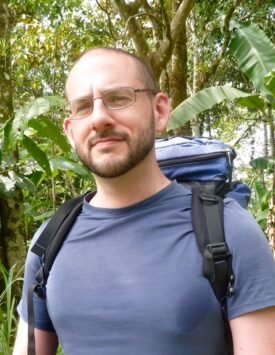Dr. David Steen joined the Wildlife Ecotoxicology and Physiological Ecology Program as a Post-doctoral Research Associate in 2012. While at Virginia Tech, David coordinated research determining the long-term ecological consequences of the 2008 Kingston, Tennessee coal-ash spill. Specifically, David studied the effects of trace-element accumulation in freshwater turtles.
David’s primary research interests include the conservation biology and landscape ecology of wildlife. He is particularly interested in identifying the impacts of anthropogenic land-use on wildlife populations and in generating research useful for land managers that wish to ensure the persistence of natural wildlife assemblages.
David received his B.S. in Zoology from the University of New Hampshire (2001) and his M.S. in Ecology and Conservation Biology from the State University of New York College of Environmental Science and Forestry (SUNY-ESF; 2003). While at SUNY-ESF, David initiated a long-term and ongoing collaboration with his advisor, Dr. James Gibbs, to determine how North American freshwater turtle populations have been negatively impacted by road mortality. After working for three years as Lead Research Technician in the Herpetology lab of the Joseph W. Jones Ecological Research Center at Ichauway, David began his dissertation work at Auburn University, co-advised by Drs. Craig Guyer (Auburn University) and Lora Smith (Jones Center). His dissertation, completed in 2011, described the long-term response of wildlife to varied longleaf pine management strategies. This work resulted in recommendations regarding how to restore wildlife assemblages that are highly-associated with the imperiled longleaf-pine ecosystem.

